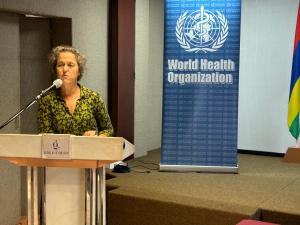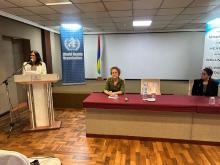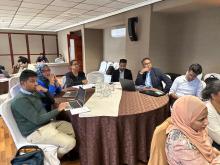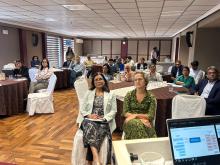WHO supports Mauritius in advancing climate-resilient health systems: new milestone reached with validation of gap analysis and institutional framework
Mauritius achieves a strategic milestone in its journey to building a climate-resilient health system through validation of the Gap Analysis Report, the draft Institutional Framework, and the Terms of Reference (ToR) for the establishment of a Climate and Health Technical Unit (CHTU).
This marks an important step towards strengthening the country’s Preparedness and Readiness for health systems resilience to Climate Change – a reality under the project “Building Health Systems Resilience to Climate Change,” funded by the Green Climate Fund and supported by the World Health Organization (WHO).
Multisectoral stakeholders comprising senior officials, technical experts, and stakeholders from across government, academia, and civil society participated in this important analysis to action, and from vulnerability to resilience process.
“The cost of inaction is measured in lives lost, services disrupted, and development gains reversed. But the benefits of action are immense: health systems that withstand storms, communities that stay healthy, and a nation that thrives despite climate shocks “This is our moment to act,” said Dr Anne Ancia, WHO Representative in Mauritius in her opening remarks. She added, “What you will do today will define the future and resilience of the country.”
The Permanent Secretary of the Ministry of Health and Wellness, Mrs Madhumattee Ramkhelawon reaffirmed the ministry’s commitment to advancing the Climate and Health Technical Unit initiative. She acknowledges that meaningful progress hinges on strong collaboration across ministries—particularly with the Ministry of Finance—to overcome financial constraints and ensure effective implementation.
“We will drive the project to greater heights, and for that, we need the support of each and every one present here today”, said Mrs N. Ramkhelawon
Mauritius identified five critical systemic gaps: Governance with absence of a dedicated climate-health coordination unit; Lack of a standalone Climate and Health Strategy and climate-proofing standards; Operational Readiness with fragile surge capacity; Limited integration of climate variables into health surveillance systems and lack of climate budget tagging in the health sector.
To address these gaps, the Institutional Framework Report proposes a transformative architecture to embed climate resilience into the health system, including:
Establishment of CHTU within MOHW.
Strengthening of the Technical Working Group on Climate Change and Health.
Integration of climate resilience into health policies, budgets, infrastructure, and monitoring frameworks.
Development of a financing strategy combining domestic resources and international climate funds.
Institutionalization of a Monitoring, Evaluation, and Learning (MEL) system with climate-sensitive health indicators.
Multisectoral stakeholders agreed on a detailed TOR for the CHTU with well-defined mandate pertaining to coordination of multi-sectoral action, strengthening data systems and early warning mechanisms, capacity building across the health workforce and partnership. It was an opportunity for the participants to express their views on the proposed CHTU, particularly regarding its key functions. This dynamic exchange fostered meaningful dialogue – highlighting the need for commitments, timelines, and accountability mechanisms and well-defined roles and responsibilities of key stakeholders.



